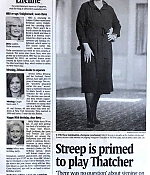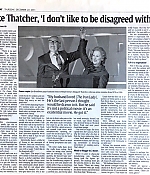|
Simply Streep is your premiere source on Meryl Streep's work on film, television and in the theatre - a career that has won her the praise to be one of the world's greatest working actresses. Created in 1999, we have built an extensive collection to discover Miss Streep's body of work through articles, photos and videos. Enjoy your stay.
|
Celebrating
25 years
of SimplyStreep
|
|
Meryl Streep gives Thatcher power in 'Iron Lady'
USA Today ·
December 20, 2011
· Written by Donna Freydkin
|
So many superlatives have been heaped upon Streep that it’s tough to separate the living legend from the flesh-and-blood woman with the lightly mussed hair jonesing for some caffeine. There’s a sparkle to Streep, 62, an innate warmth and a goofy sense of humor. She wears the mantle of world’s greatest living actress lightly, apologizing when her dress gets askew and flashes a bit of skin, and admiring photos of your child before sighing that “it all goes so fast, so fast.” And, she’s quick to point out, there’s not a bounty of juicy roles for even her out there. “There aren’t that many movies around, available. There aren’t that many movies written that I could do. Sometimes they’ll take a villain’s part and turn it into a woman. There aren’t a lot of parts. There aren’t a lot of serious movies,” she says. “That’s all right. I like comedies, too.” But once in a great while comes a part so multidimensional, so delicious, so revelatory as to be irresistible. Such was the case with The Iron Lady, which stars Streep as Margaret Thatcher, the polarizing, controversial British prime minister who served from 1979 to 1990. The film opens in limited release Dec. 30 and goes wide Jan. 13. Thatcher, a lawyer and the first woman to lead a major British political party, championed deregulation, reform for trade unions and the privatization of state-owned companies. The role has earned Streep Golden Globe and Screen Actors Guild nominations and makes her an Oscar shoo-in. When Phyllida Lloyd, who had directed Streep in the campy 2008 musical Mamma Mia!, sent her this script, “there was no question” about saying no, says Streep. Or even mulling it over.
“There is no part like this because there’s no woman like this. I’m going to turn that down because I don’t like her politics? My God,” says Streep. “Part of what interested me about this whole thing was seeing why we are so uncomfortable on a certain level with women leaders and with their male partners feeling diminished. It’s an interesting thing for us to contemplate.” Lloyd, meanwhile, can expound on the juiciness and depth of the part and why Streep was perfect for it. “But let’s cut to the chase: Who wouldn’t want to work with Meryl twice? To have a role worthy of Meryl was the point,” she says. “Margaret Thatcher was a superstar in Britain and the wider world. We all felt we needed somebody of Meryl’s magnitude to play her. She was a huge personality. The role takes place over 35 years. It’s a gargantuan undertaking for any actor.” The film encompasses Thatcher’s youth, her rise to power, her time in office and her marriage, viewed in flashback as dementia chips away at her brain. For Streep, tackling a persona this monumental meant bringing her down to human scale and playing her as a woman who often overbearingly presides over Cabinet meetings but also pines for her distant son and resolutely cleans out her dead husband’s closet.
“You approach each one as a person. They’re all pretty much the same size: my size. I knew I’d have to do a lot of research. We wanted to get the facts as right as we possibly could,” says Streep. “But at the same time, this is a film coming from her own mind, her memory. It’s a look back. It’s random and not chronological. We remember things that worry us and the glory days.” Even scenes depicting Thatcher’s waning years, as she has entire conversations with a husband who’s no longer alive, resonated with Streep. “There’s certain things about that state that I understand viscerally. In terms of talking to people who are not there: I talk to my dad. I talk to my mother at least once a day in my head,” she says. “What transpires in our minds is crazy behavior. As we get older, that’s just more apparent. We’re less able to hide it than we are when we’re younger.” Admittedly, there’s a little bit of Streep in her portrayal of Thatcher. She’s not a workaholic like the politician. But, says Streep with a laugh, “I don’t like to be disagreed with.” Says Lloyd: “The ways I’d say she’s similar is that she’s a public figure, a global superstar, who has had to juggle a huge career with bringing up four children. She understands about leadership, that it’s not about who shouts the loudest. It’s about who gets there first, who is the last one to drop, who puts in the hours, who does set the example, who does make everybody else want to go the extra distance. She’d be a great person to sail around Cape Horn with, metaphorically speaking, because she would inspire. She’s a leader in that way, but she leads entirely by example.”
Case in point: There’s no team of Streep sycophants and lackeys. “On some really basic level, she really loves acting. She’d rather be acting than dealing with an entourage. So, consequently, she doesn’t have one,” says Lloyd. “You can only imagine the transforming impact of that on a crew and anyone she works with. It has an enormous affect on everyone around her.” Her position in the industry is a rarefied one, and Streep takes her work seriously. Herself, not so much, says David Frankel, who directed Streep in The Devil Wears Prada and next year’s Great Hope Springs. “She loves to laugh. She loves a good time. She’s joyous. Part of why she does what she does is that she loves celebrating. She’s a ham. She’ll admit it,” says Frankel. “If there’s no movie to shoot, she’ll be singing somewhere or lecturing somewhere or reading poetry. That’s Meryl.”
When it came to physically transforming into Thatcher, Streep took the lighter approach. The makeup team got the process down to less than two hours. “There are many, many actresses who get ready for photo shoots and need more time than that,” says Streep. Lloyd shot the film out of sync, so Streep spent no more than three days in a row as the elderly Thatcher. “When you’re encased in something, you can’t feel the movement, the very specific movements that old people make. I didn’t want the movement to be prescribed by the limitations of the prosthetics,” she says. More difficult was being hunched over as Thatcher in her decline, tottering around mostly in a fog. “To stand that way for that many hours every day, that was the hardest thing. To stand in that S curve,” says Streep. “That was painful. But it did improve my posture. We all have that old lady that we’re going to be eventually in us right now.” Perhaps the greatest validation that Streep received for a film she worries may not connect with guys: Her husband, sculptor Don Gummer, enjoyed it, and so did her son, Henry, 32. She also has daughters Mamie, 28, Grace, 25, and Louisa, 20.
“My husband loved it. He’s the last person I thought would be drawn to it. But he said it’s not a political movie, it’s an existential movie. He got it. That made me really happy, that my husband and son wanted to see it a second time,” she says with a smile. Yes, her achievement as an actress is astonishing. Yet even more astounding is how Streep has remained a decent human being. Frankel recalls inviting Streep to the editing room for the first time when he was working on Prada. “She was there in 20 minutes. She said the train got stuck in a tunnel. That’s her. She didn’t call for the limo. She hustled her (expletive) up there,” says Frankel.
And on this day, an hour-long chat with the actress will encompass discussions of sushi and mercury levels in fish (a big concern of hers), why she moved her family out of Manhattan to live in Connecticut (when son Henry was 4, she noticed he was eye-level with car tailpipes, blowing the exhaust directly in his face, and became worried) and the question of how much professional achievements really count, in the long run, when it’s the end of your life and your mind is nearly gone. “It does matter. But what matters is maybe different. Life is a negotiation. Every woman knows that. It was an interesting subject to consider,” she says. Another topic she can’t help but consider is awards season. Streep has earned a record 16 Oscar nominations, winning twice, for 1982’s Sophie’s Choice and 1979’s Kramer vs. Kramer. Does she pay attention to awards buzz? “How can you be in this business and not? It’s sort of a non-starter, that conversation. I don’t have a response,” says Streep. “I’m really proud of (Iron Lady). I really want people to see it. I especially want women to go out on the first weekend and see it. Our budget was $14 million, which was less than 10% of Hugo. You have to scramble so hard to make a movie about women.”
Streep is perhaps the film’s best advocate. Sure, the latest Mission: Impossible is roaring into theaters. But The Iron Lady will also blow audiences away, she swears. “There are special effects. There are bombs. There are explosions galore,” she promises with a wink.











